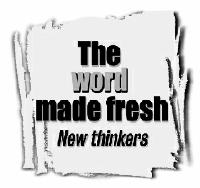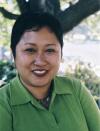|
Issue Date: September 26, 2003
Scholar, artist, minister and more: Filipina-American theologian values being 'multilingual' By JANE REDMONT Rachel Bundang rocks. She sings, plays jazz and gospel piano, and listens to hip-hop, classical and Brazilian music. On her laptop are musical selections from Los Amigos Invisibles, a Venezuelan funk group. She speaks English, French, Spanish and Tagalog, a language used in the Philippines. She moves from stage to pulpit to Manhattan street with aplomb. She talks politics, art, culture and religion, peppering her sentences with language taken from urban neighborhoods and the halls of academe. She studied tap and ballet as a child and took up modern dance in college, and then there’s salsa dancing, of course, at parties. Bundang is also a leading Asian/Pacific-American Catholic theological ethicist. A “1.5 generation” Filipina-American (born in the Philippines but raised in the United States), she is a leader and former conference chair of Pacific/Asian and North American-Asian Women in Theology and Ministry (PANAAWTM, pronounced “pan-autumn”), served for three years as co-convener of the American Academy of Religion Women’s Caucus/Religious Studies, and has since 1997 been a delegate to the U.S. Minorities Section of the Ecumenical Association of Third World Theologians. She is active in the four-year-old Asian Pacific American Religions Research Initiative.
Behind these involvements is the constant negotiation of complex identities -- American, immigrant, New York resident and frequent California visitor, raised in the deep South, heir to her mother’s popular religion and forger of new religious paths, daughter of a Navy man, Catholic high school alumna, feminist of faith, working-class and “double Ivy” (Princeton and Harvard), Pinay (Filipina-American), intellectual, artist, minister, scholar. Working her way through a Ph.D. in ethics at Union Theological Seminary in New York, Rachel Ann Rodríguez Bundang has spoken around the country on such varied topics as young adult ministry, home and exile, devotions to Mary and Jesus in Filipino-American Catholic life, the ethics of cyberspace, Asian/Pacific-American women’s theologies, and New York City memorials in the wake of Sept. 11. Besides a vast collection of music, her laptop also holds speeches, homilies, papers-in-process, and a voluminous correspondence with friends around the United States. And Bundang says she’s an introvert. Bundang, born on the feast of the Epiphany, her ties to Catholicism “thick as blood,” was schooled in ecumenical settings -- Harvard Divinity School and Union Theological Seminary respectively -- and cut her teeth on cross-disciplinary projects. Much of her early work examined popular religion in the Filipino-American community. “I always thought if I could figure out what was going on in my family religiously, everything would make sense,” she said with a laugh. Studying and “sorting out” the relationship between religion and culture “is my primary motor,” said Bundang. Filipino-American religion -- Catholicism in most cases -- “is not something people have thought was worthy of exploration or study,” Bundang observed. “So much is not known to the general public and even the church.” She has focused several studies on rituals, celebrations, festivals, pilgrimages and devotions. “Practice and traditions,” she said at a recent gathering of scholars, “are texts just as much as scriptures are. They can be especially revealing, and they ought to be examined with the same care.” Popular religion transplanted to the United States is, Bundang said, “a much more private affair” than in the Philippines where “it feels more organic to the culture.” In immigrant communities, “you’re not doing it at your local parish church; you’re doing it in the closed space of your home and you invite people. It’s not something a rambling pilgrim could find. It’s more a private add-on … a religious need that might not be fulfilled on Sunday.” Asian/Pacific-Americans are one of the fastest growing minorities in the United States, and Bundang is convinced of the broad significance of her work on religion and culture. “It’s important to be aware of who your neighbors are. For political reasons, for social reasons, for the sake of justice and community.” At 34, a member of “Generation X,” Bundang has problems with literature on the subject that, she said. Much of what is written “discusses things more from the perspective of a single generation,” as if Gen X were isolated, away from parents and grandparents. For Bundang, as for many children of immigrants, intergenerational questions are ever present. Bundang is, however, concerned about the church’s lack of attention to young adults. Young adults who stay single a long time or must make difficult financial choices “because they’re dealing with mountains of student debt while trying to build a career” are not, she said, on most parish radar screens. As for careers, she noted, “not everyone is going to come as an investment banker -- or as a nonprofit grassroots organizer. Inside that spectrum is a potential church to be fed.” “Gen X as a notion doesn’t address the diversity of experiences growing up in the U.S.,” Bundang said. “It doesn’t address people who are not white middle-class.” An editorial board member of the Web site of Paulist Young Adult Ministries, Bundang remembered asking during a consultation with the Paulist Fathers, “ ‘For whom are you building this young adult ministry?’ There’s the digital divide to consider,” she said. “And what is this [ministry] going to say to someone who has a McJob, and is very thankful to have a McJob, and is Spanish-speaking and from a whole other country? They are young adults too. They have young adults too, these communities’ ” -- of immigrants, of the working class, of the underclass. Bundang spoke of “the permanent burden of having to educate and raise others’ consciousness.” Part of what Bundang has to keep repeating in public presentations is a summary of the colonial history of the Philippines and of the religious history of colonization “and how that affects the various immigrant communities that are here now -- not just Filipinos, but Mexicans, Cubans, others.” The other side of this ethnicity -- which other scholars of color speak of often -- is finding oneself “constrained and pigeonholed and ghettoized in the academy. … Feeling like no one is going to listen to me unless I do ethnic things.” She added, “There are other things I would like to include in my intellectual repertoire: cyberspace, technology and community, issues involving art and aesthetics that might not be specifically linked to questions of ethnicity.” For four years after college, Bundang worked for the U.S. Department of Education’s Upward Bound Program and another program for “underprivileged” students. She applied to joint master’s programs in education and theology. After acceptance by theological programs only, she went to divinity school, deciding she would treat the three years of study as “a retreat for myself -- except with student loans,” she said. “And then I would eventually find my way back to doing what I had before.” Bundang’s direction changed in her first year of theological study, when she attended the annual conference of what later came to be called PANAAWTM. She ended up as coordinator of the national conference the following year. She has been a PANAAWTM regular ever since. In keeping with her commitment to linking cultural and pastoral practice with sustained reflection, Bundang is launching into an ethical evaluation of Asian/Pacific-American feminist theology. In particular, she is turning her gaze to how its thinkers “put their theology to work: Is it effective? Are you doing what you intended to do? Is this helping the people you intended to help?” Like theologians Ada María Isasi-Díaz and Rita Nakashima Brock, Bundang frequently uses the term “communities of accountability” when talking about her academic work. An advocate of careful critical thinking, she believes theory can help keep practice honest, but urges “making the theology practical and concrete and not just theoretical, because theory doesn’t feed someone at the end of the day.” Asian/Pacific-American feminist theologians, she said, need to be “engaged with the communities with and for and about whom they claim to be writing.” This ethical evaluation of a new theological movement is delicate work: Bundang may end up criticizing some of her closest colleagues. “It’s not easy critiquing the people who’ve helped you,” she said. “I’m not doing it to be contrarian. But I’d like to think all of us care about approaching our scholarship with integrity.” And, she said, “I’ll throw my own stuff in there. I’m not going to exempt myself. That’s only fair.” Bundang has preached, presided at Communion services, and engaged in other liturgical and pastoral work for more than eight years. While her Pinay identity and her Catholicism have come “as a package,” she has more than once thought about moving to another Christian communion to follow her call to ordained ministry. Local faith communities, Bundang says, have cultivated this call. Asked what her dream job would be, she replies: “A both/and kind of job -- to be a community’s theologian in residence so that I could be engaged in pastoral ministry while still teaching. I need to be grounded someplace. It’s the priestly vocation question most of all,” she added. Still, she said, on some days she thinks, “I’m content -- not content,” she corrected herself, “strong enough -- to slog through the messiness of lay ministry.” Though her love of learning “borders on addiction,” the specialization expected in academia “doesn’t work well for a generalist like me,” she said. “I don’t like the narrowness and compartmentalization it leads to. … Yes, you should be grounded in a discipline, but it’s useful,” she said, to learn other approaches and methods -- “to be multilingual.” Jane Redmont of Berkeley, Calif., is the author of Generous Lives: American Catholic Women Today and When in Doubt, Sing: Prayer in Daily Life. National Catholic Reporter, September 26, 2003 |
 Negotiating complex identities
Negotiating complex identities